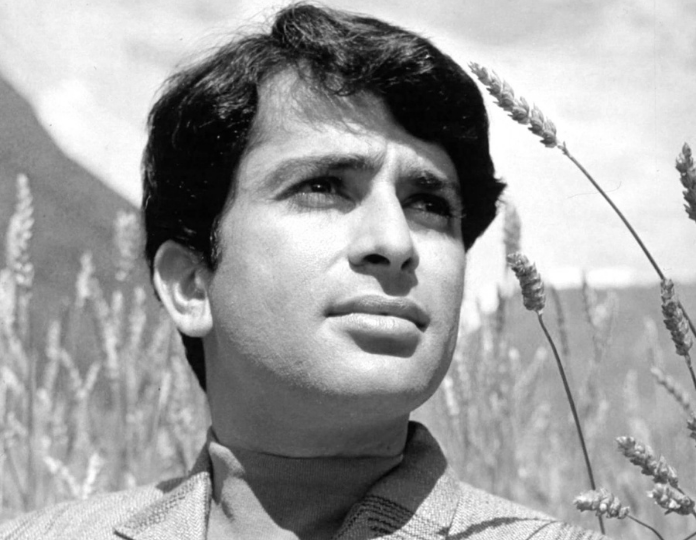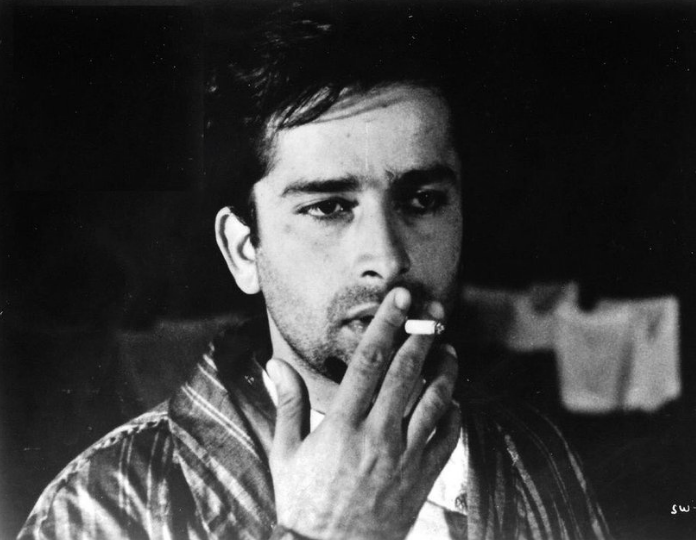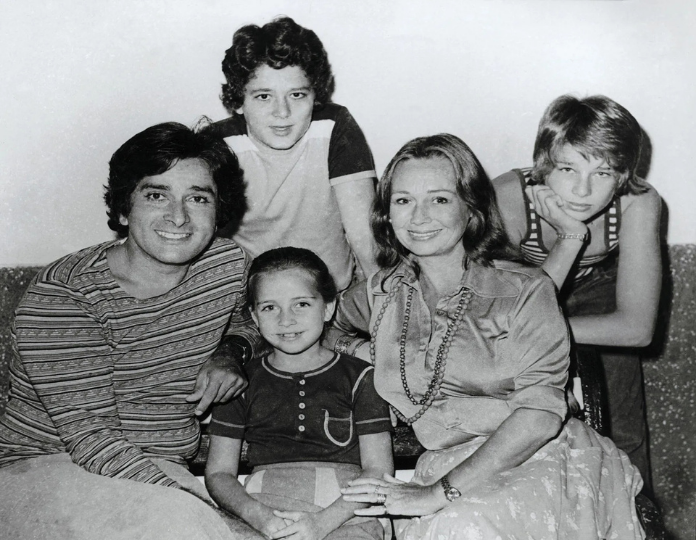One of the most charming and beloved actors of Indian cinema Shashi Kapoor was not only an actor of immense calibre but also a pioneering personality who was responsible for the revival of Prithvi Theatre.
The actor-producer-director Shashi Kapoor, a recipient of four National Film Awards and two Filmfare Awards, made over 160 movies. He also got the Padma Bhushan in 2011 and the Dadasaheb Phalke Award in 2014 for his contribution to Indian cinema.
Early Life
Shashi Kapoor was born Balbir Raj Kapoor on March 18, 1938, in Calcutta to Prithviraj Kapoor and Ramsarni Mehra Kapoor. As the youngest son of the legendary theater and film pioneer Prithviraj, Shashi was immersed in the performing arts from an early age. His elder brothers, Raj Kapoor and Shammi Kapoor, were already making waves in the film industry, setting the stage for Shashi to join the family legacy.
The Theatre Roots
Growing up in a household steeped in creativity, Shashi was exposed to the world of theatre through his father’s Prithvi Theatres, established in 1944. He began performing on stage at the tender age of four, playing Bharat in the troupe’s debut production, “Shakuntala.” This early immersion in theater shaped his understanding of performance and storytelling.
Shashi attended Don Bosco High School in Matunga, Mumbai, but his passion for the arts led him to leave formal education behind at 15 to pursue theater full-time. From 1953 to 1960, he worked with Prithvi Theatres, learning the intricacies of stagecraft—from acting to lighting and sound—skills that would later enhance his cinematic career.

Shashi Kapoor Became An Actor
Shashi’s entry into films began as a child artist in the late 1940s, under the name Shashiraj. His early roles included playing the younger versions of his brother Raj Kapoor in films like Aag (1948) and Awaara (1951), both directed by Raj. He also appeared as the young Ashok Kumar in Sangram (1950) and acted alongside Bharat Bhushan in Dana Paani (1953). These initial forays into cinema showcased his natural talent, even as a child.

In 1956, at the age of 18, he joined the British actor Geoffrey Kendal’s Shakespeare company and fell in love with one of Kendal’s daughters, Jennifer, whom he subsequently married in 1958.
His debut as a leading man came in 1961 with Yash Chopra’s “Dharmputra,” a political drama that addressed the partition of India. Though the film was not a commercial success, it marked Shashi’s transition to adult roles. Between 1962 and 1964, he saw modest successes with films like Bimal Roy’s “Prem Patra (1962),” Kanak Mishra’s “Yeh Dil Kisko Doon” (1963), and S. Khalil’s “Benazir” (1964), but none significantly boosted his career.
Breakthrough Of Shashi Kapoor
His breakthrough came in 1965 with two major hits—Yash Chopra’s epic “Waqt” and Suraj Prakash’s “Jab Jab Phool Khile.” In multi starrer Waqt, he played the younger son of Balraj sahin and starred opposite Sharmila Tagore. “Jab Jab Phool Khile,” a romantic drama opposite Nanda, established him as a romantic hero. The film’s success, coupled with his striking looks and effortless charm, made him a household name.
In next 8-9 years he experienced a period of moderate success and heartbreaking failures. He got occasional succes like “Pyar Kiye Jaa (1966),” “Haseena Maan Jayegi (1968),” and “Kanyadaan (1968)” in this period. He also starred in blockbusters “Sharmeelee (1971),” and “Aa Gale Lag Jaa (1973).” However, he made a remarkable comeback in 1974 with “Chor Machaye Shor,” opposite Mumtaz. The film was a big musical success and had iconic songs like “Ghunghroo Ki Tarah.”
His success with “Chor Machaye Shor” elevated him to the top tier of stars, delivering box office hits like “Kapda Aur Makaan (1974),” “Chori Mera Kaam (1975),” “Fakira (1976),”
Renowed Success
In the 1970s, he became one of Bollywood’s busiest actors, often working on multiple projects simultaneously. His collaborations with Amitabh Bachchan and director Yash Chopra produced some of his most iconic films. In “Deewaar (1975),” he played the upright cop Ravi opposite Bachchan’s brooding anti-hero. The film featured the unforgettable line “Mere paas maa hai” which remains one of Hindi cinema’s most iconic dialogues. He won the Filmfare Best Supporting Actor Award for this role.
Other notable Chopra collaborations include Yash Chopra’s “Kabhi Kabhie (1976).” The multigenerational love story saw Shashi playimg a understanding husband to Rakhee. He again worked with Yash Chopra in “Trishul (1978),” and “Kaala Patthar (1979).” While in Trishul, he portrayed a supportive stepbrother, in Kaala Patthar he portrayed a compassionate engineer. Shashi continued to give remarkable performances in films like “Satyam Shivam Sundaram,” “Suhaag,” “Kranti,” and “Namak Halaal.”
Shashi’s career was enriched by collaborations with some of the industry’s finest talents. His partnership with Yash Chopra produced a string of hits, blending commercial success with emotional depth. His on-screen chemistry with Amitabh Bachchan is seen in 11 films. He also frequently collaborated with actresses like Sharmila Tagore (12 films) and Rakhee Gulzar (10 films), delivering memorable performances.


Exploring New Horizons
As time went on, he grew weary of mainstream Hindi cinema and sought refuge in films like Shyam Benegal’s Junoon (1978), Aparna Sen’s 36 Chowringhee Lane (1981), Girish Karnard’s Utsav (1984), and Ramesh Sharma’s New Delhi Times (1986). The 1970s and early 1980s offered a conducive environment for more thought-provoking independent cinema, and Shashi embraced the opportunity these films provided for artistic exploration. He received praise for his diverse roles, including a reckless chieftain in “Junoon,” a businessman in “Kalyug,” a strict father in “Vijeta,” and an honest journalist in “New Delhi Times,” earning him the National Film Award for Best Actor.
As a producer, Shashi supported art cinema, with films like Vijeta. His films “Junoon (1978) and Kalyug (1981),” earned him Filmfare Best Movie Awards. His directorial debut, “Ajooba (1991),” starring Amitabh Bachchan, was a grand but commercially unsuccessful venture.
International Recognition
Beyond Bollywood, Shashi gained international recognition through his work with Merchant Ivory Productions. His debut English-language film, The Householder (1963), marked the beginning of a long collaboration with Ismail Merchant, James Ivory, and Ruth Prawer Jhabvala. In 1965, Ivory and Jhabvala wrote “Shakespeare Wallah,” based on the Kendals’ touring company. In the film Geoffrey, Jennifer, Felicity, and Kapoor played fictitious versions of themselves. Among Kapoor’s other memorable films was Pretty Polly (1967), from a story by Noël Coward.
He went on to star in international films like “Bombay Talkie (1970),” “Heat and Dust (1983), and “The Deceivers (1988),” bringing a nuanced Indian perspective to global audiences. His role in Siddhartha (1972), based on Hermann Hesse’s novel, further solidified his international presence. Ivory’s partner, Ismail Merchant, made his directorial debut with In Custody (1994), based on a novel by Anita Desai. In the film, Kapoor portrayed an ageing poet who was disillusioned with life in his old age.
Other films featuring the actor include Conrad Rooks’ Siddhartha (1970), Stephen Frears’ Sammy and Rosie Get Laid (1987), written by Hanif Kureishi, Jinnah (1998) with Christopher Lee, and Tony Gerber’s Side Streets (1998). Assad Raja’s Dirty British Boys was Kapoor’s last film before he retired in 1999.
Revival of Prithvi Theatre
In 1978, alongside his wife Jennifer Kendal, he revived Prithvi Theatre in Juhu, Mumbai, transforming it into a hub for creative expression. As managing trustee, he ensured it remained a space for nonconformist, value-driven art, free from commercial pressures.
Shashi’s dedication to Prithvi Theatre was unwavering, even in his later years when mobility issues confined him. He attended special festivals and events, fostering an environment that inspired generations of theater artists. His efforts helped sustain the legacy of Prithviraj Kapoor while creating a lasting impact on Indian theatre.
His achievements include four National Film Awards, two Filmfare Awards, the Padma Bhushan (2011), and the Dadasaheb Phalke Award (2014), recognising his contributions to Indian cinema. Shashi also get Filmfare Lifetime Achievement Award in 2010.

Personal Life and Legacy
Shashi Kapoor and Jennifer Kendal went on to have three children, Kunal, Karan and Sanjana. Kunal, is a former actor and an ad filmmaker. Karan who had a brief career as an actor, is a model and photographer. His daughter Sanjana, was also an actor who now manages Prithvi Theatre. Their marriage was a partnership of love and collaboration, seen in films like “Bombay Talkie” and their work on Prithvi Theatre. Jennifer’s death from colon cancer in 1984 was a devastating blow, leaving Shashi heartbroken. He never remarried, dedicating himself to his family and work.
In his later years, Shashi retreated from the public eye, battling health issues including liver cirrhosis and heart complications. He passed away on December 4, 2017, at Kokilaben Dhirubhai Ambani Hospital in Mumbai, at the age of 79. His death, attributed to liver cirrhosis, marked the end of an era. He is not with us but his legacy lives on through his family and the institutions he nurtured.
Shashi Kapoor’s legacy is multifaceted, encompassing his cinematic achievements, his contributions to theater, and his personal integrity. His work with Prithvi Theatre continues to inspire artists, while his films remain classics. Posthumously honoured at the 90th Academy Awards alongside Sridevi in the memorium section, Shashi’s influence transcends borders. His children and grandchildren, including grandson Zahan Kapoor (debuted in Faraaz, 2023), carry forward the Kapoor legacy, ensuring that Shashi’s contributions to the arts endure.
Shashi Kapoor on IMDB














Leave feedback about this